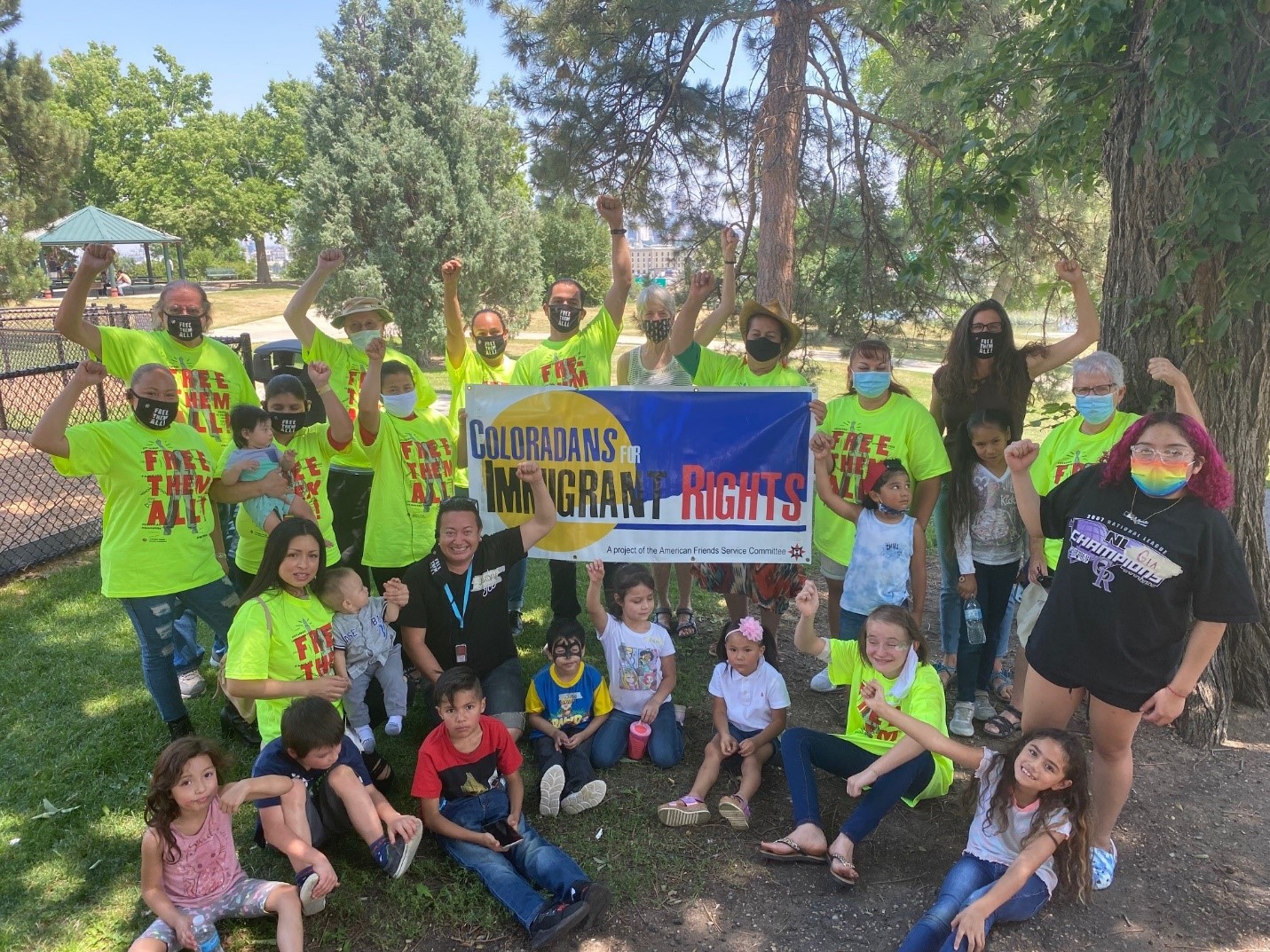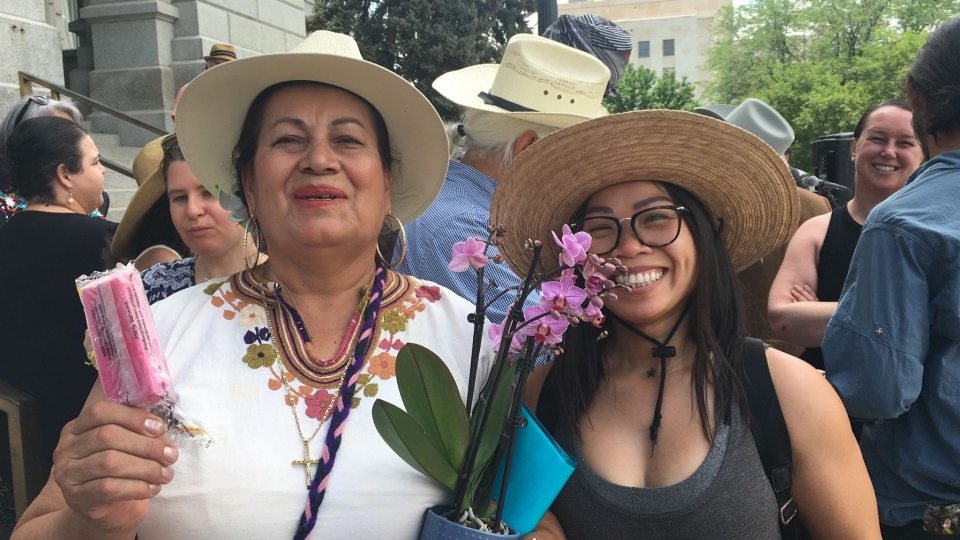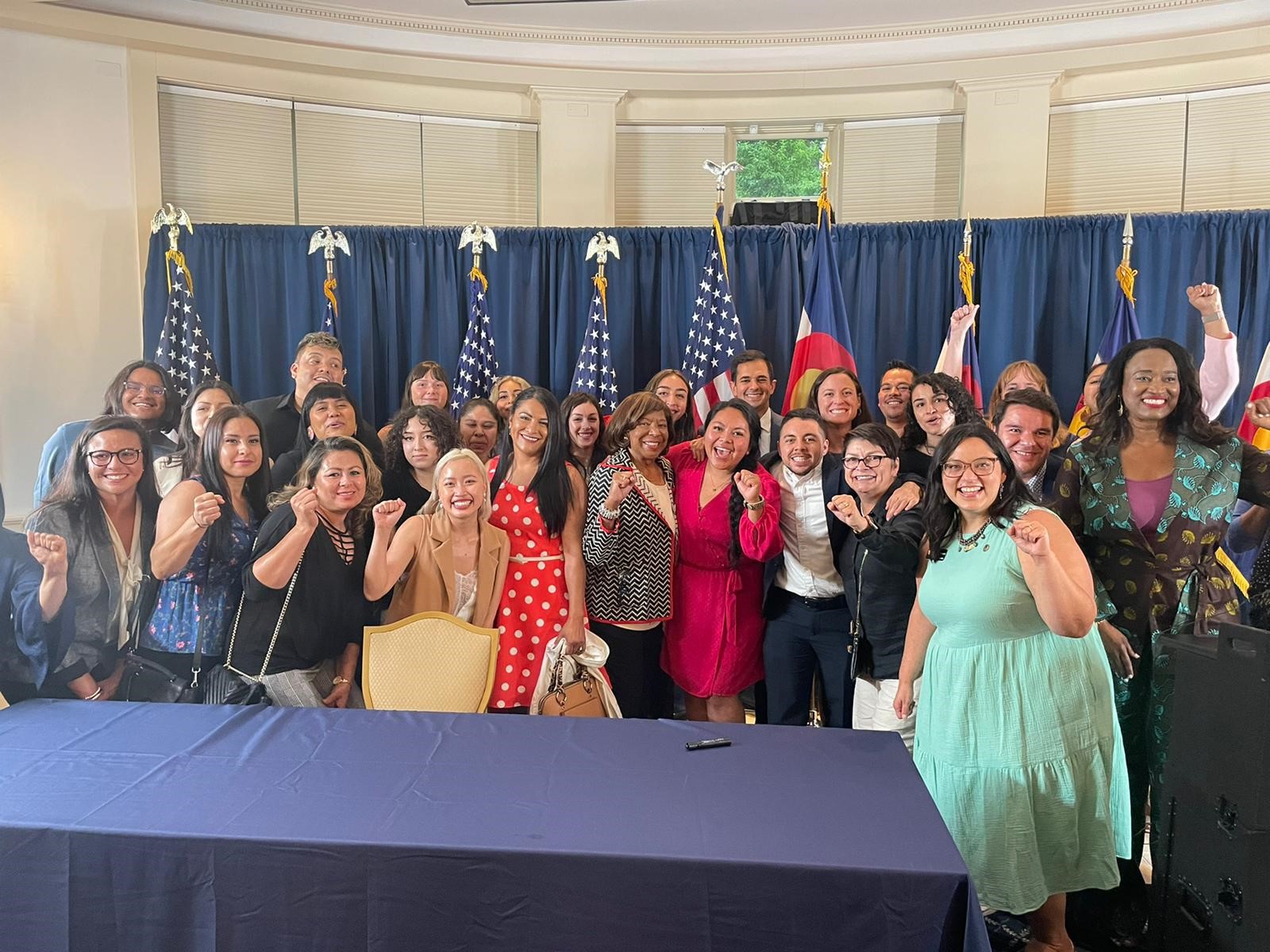
Earlier this summer, members of AFSC's Not1More Deportation Table and Coloradans for Immigrants Rights gathered to celebrate legislative victories they helped to secure. Diana Antillon
In 2006, Colorado passed the most oppressive anti-immigrant laws in the country. Among them: barring state funds to treat undocumented Coloradans at clinics or provide them in-state college tuition; excluding qualified individuals from professional licensing; and a meausre that required local law enforcement to collude with Immigrant and Customs Enforcement (ICE)—resulting in the unlawful detention of thousands of Coloradans over the years. Lawmakers intended to make it so hard for our immigrant neighbors, to punish them so much for lacking a piece of paper, they would leave.
Today—15 years later—Colorado has become a leader in pro-immigrant legislation, thanks to the leadership of immigrants supported by AFSC and a deeply collaborative space we’ve cultivated among partner organizations. Those years of work culminated in 2021 when the Colorado Legislature passed a dozen progressive bills to protect and expand the human rights of immigrants. AFSC’s three top priorities passed: establishing a fund to provide universal legal representation for immigrants, a data privacy law to prevent state agencies from sharing information with federal immigration authorities, and an agricultural workers’ bill of rights.
These changes wouldn’t have happened without the persistence of AFSC’s Not1More Deportation Table, a group AFSC convened in 2012 to provide mutual aid and support for people and their loved ones facing deportation. AFSC staff support and coordinate the project, providing opportunities for leadership development, training to analyze the systemic nature of injustice, tell their personal stories, advocate with legislators, and move other immigrants to action.
Members of the Not1More Table engage legislators and community members alike. As part of the successful campaign for a universal legal representation fund for immigrants, Liceth Bañuelos authored this opinion piece. She highlighted how only 15% of immigrants facing deportation without a lawyer win their case, compared with 85% for those who have legal representation. The starting budget for Colorado’s new universal representation fund is $200,000 per year—a figure that AFSC Colorado hopes to increase in the future. Just as important, the bill will truly help to provide representation for all, with only one eligibility requirement—not being able to afford an attorney.
Meeting directly with legislators has made a huge difference, Liceth says. “My participation in the Not1More Deportation Table has given me the opportunity to see the positive impact that telling our stories can have on elected officials, since many of them don’t know about our suffering or are misinformed.
"When we share our lived experiences in front of them, some of them change their opinion. They stop seeing us as statistics and start seeing us as active members of our community with needs like theirs,” Liceth says.

Another Not1More member, Juana Armijo, is a former farmworker who provided key testimony in support of the state’s new agricultural workers’ bill of rights. “Working conditions were terrible,” Juana says of her time as a farmworker. “I experienced exploitation in every place that I worked, such as wage theft and sexual harassment.” By testifying and pushing for a bill of rights that includes overtime pay and the right to organize, Juana hopes others won’t have to suffer the injustices she’s experienced.
AFSC Program Director Gabriela Flora adds, “You can’t negate the reality of what someone has experienced. When Juana spoke about the exploitation she experienced, sharing from her heart what it meant, her story shifted the dynamics of the legislative meetings.” Gabriela says she’s seen lawmakers moved to tears when immigrants tell them their stories and share their solutions. “AFSC is proud to have joined this legislative effort led by Project Protect Food Systems Workers.”
The importance of allies
Allies have played a big role in supporting immigrant leaders. In relationship with the Not1More table, they use their privilege to open doors and center immigrants as experts. Jordan Garcia, program director, has worked for years developing Coloradans For Immigrant Rights (CFIR), AFSC’s allies’ group.
“When we first began organizing, it was a little bit clumsy,” he says. “People weren’t sure they were able to speak on these issues, but they recognized that it was important for us to speak out as allies and bring other people along to support immigrant communities. It’s been beautiful watching this process unfold.”
Program Director Jennifer Piper adds that while the recent legislation was monumental, the work continues. “I hope we roll up our sleeves and do the hard and inglorious work of implementation and holding the state accountable to itself,” Piper says. “What’s more, I hope that as a country, we'll listen to the messages and warnings immigrant leaders bring us about our global crisis of capitalism, xenophobia, racism, climate change, and humanity—and that we rise to the challenge.”

Looking ahead: Expanding Not1More into rural areas
Thanks in part to a grant from Colorado Trust, AFSC recently contracted with Guadalupe “Lupe” Lopez, a long-time Denver Not1More leader, to expand the Not1More Table eastward to Ft. Morgan, CO where she now lives. Ft. Morgan is the most diverse town in Colorado, with immigrants, asylum seekers, and refugees making up a large portion of its population. Many newcomers face barriers to health care, legal services, and basic knowledge of their rights while going through immigration proceedings.
In six short months, a group of a dozen families—most of whom are asylum seekers—have begun meeting regularly. As AFSC works to connect members to resources and legal support, immigrants are now forming plans to document and organize against violations of their labor rights. Several Ft. Morgan Not1More members are joining Denver Not1More members in AFSC’s quarterly vigils at the immigrant detention center and in meetings with legislators to discuss their concerns.
It’s overwhelming to reflect on the transformation Colorado has undergone, thanks to 15 years of organizing and advocacy led by immigrants in the state, says Piper.
“On the one hand, 15 years is too long when I think of all the people we have lost to deportation and the suffering of their loved ones, the children and families who are a part of the fabric of our communities being excluded." Piper says. "On the other hand, it's a blink in the eye of history and incredible that this shift has occurred.”
Supported by 15 years of AFSC’s leadership development, immigrants and allies in Colorado are changing both policies and decision makers. As they continue to build even more power, it’s exciting to imagine what they will accomplish in the years to come.